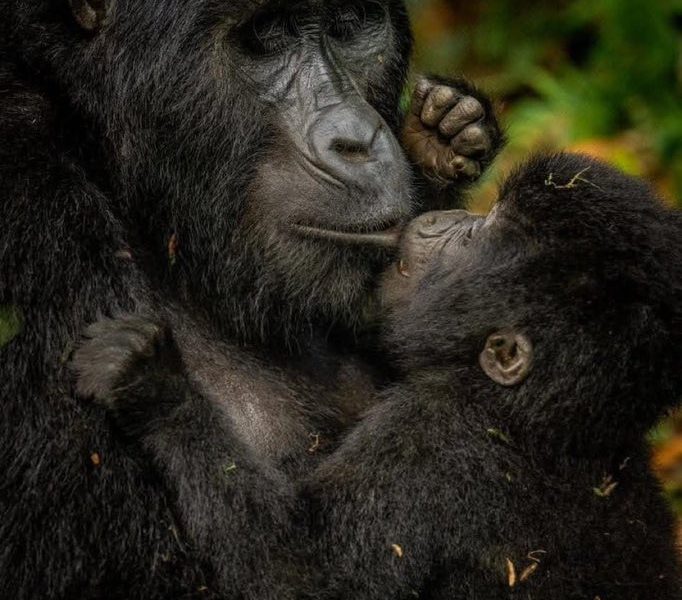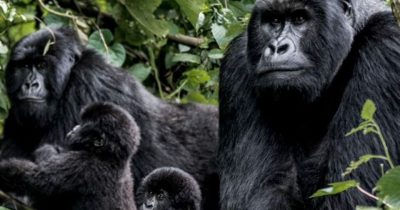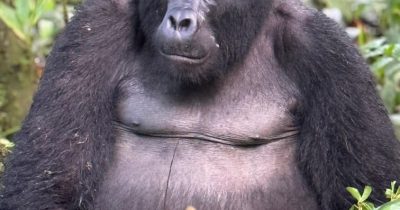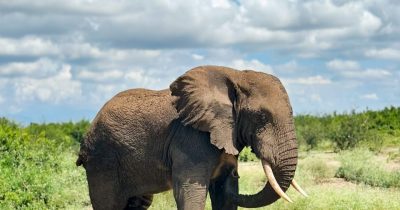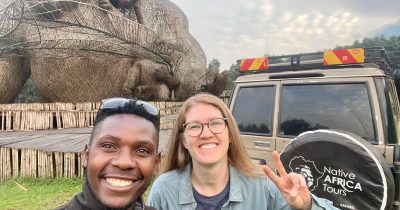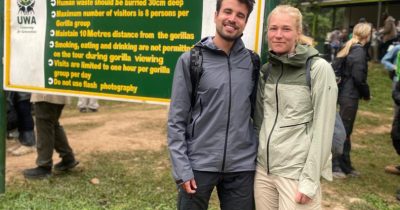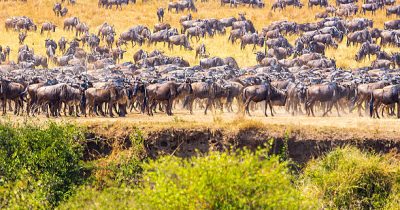Eco Friendly Gorilla Trekking in Uganda
Eco friendly gorilla trekking in Uganda invites nature lovers to partake in adventures, encouraging sustainable travel practices. These eco-friendly safaris offer responsible ways to explore and enjoy Uganda’s beauty. Gorilla trekking is the premier activity, drawing numerous tourists to witness the country’s rich diversity and stunning landscapes.
Gorilla trekking offers an eco-friendly adventure. It provides a unique opportunity for visitors to explore the jungle and interact with mountain gorillas in their natural habitat while adhering to specific ethical guidelines. This rare chance to observe these majestic creatures up close is a thrilling and privileged experience.
Eco Friendly Gorilla Trekking Destinations in Uganda
Bwindi Impenetrable National Park
Bwindi Impenetrable National Park stands out in Uganda as a prime destination for eco-friendly gorilla trekking adventures. This park features four accessible sectors for tourists starting their journeys. The four areas to embark on eco-friendly gorilla treks in Bwindi are Ruhija in the east, Buhoma to the north, and Rushaga and Nkuringo to the south.
Bwindi has approximately 24 habituated mountain gorilla families that can be tracked across four sectors. In the Ruhija sector of Eastern Bwindi Impenetrable National Park, you can find the Bitukura, Oruzogo, Kyaguriro, and Mukiza gorilla groups. The Nkuringo sector, located in the southern region of Bwindi, features habituated families including the Christmas, Nkuringo, Posho, and Bushaho gorilla groups.
The Rushaga sector boasts the highest concentration of gorilla groups, such as Bweza, Kutu, Mishaya, Kahungye, Tindatine, Nshongi, Busingye, Mucunguzi, Bikingi, and others. Meanwhile, in the Buhoma sector, you can track families including Mubare, Katwe, Habinyanja, and Rushegura.
Mgahinga National Park
Mgahinga National Park offers a chance to trek with gorillas while avoiding large crowds. Situated in Kisoro, it is home to the Nyakagezi gorilla family, the only group here habituated to tracking. A maximum of 8 visitors are allowed to track the Nyakagezi gorilla family in the park.
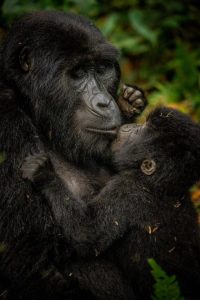
Gorilla Trekking Permits in Uganda
Obtaining a gorilla permit is essential for going gorilla trekking in Uganda. A valid license costs USD 800 per person for foreign nonresidents, USD 700 per person for foreign residents, and UGX 300,000 for citizens of the East African Community. This fee contributes to conserving the gorillas and their habitat, ensuring that future generations can also enjoy this unique experience.
Obtaining a gorilla permit in Uganda is possible through a trusted tour operator. The process involves securing a license for a specific date and location, which can be competitive due to the limited number of daily permits. Our expert can guide you through this process and tell you the best time to secure your permit. Additionally, you can partake in the gorilla habituation experience in Uganda, with a license available for USD 1500 per person.
What is the cost of the Sustainable Gorilla tours in Uganda?
The price of an eco-friendly gorilla tour in Uganda depends on several factors, such as the duration, the season, the number of participants, and each visitor’s lifestyle choices. These lifestyle choices can include accommodation preferences, dietary restrictions, and additional activities or services you may wish to include in your tour package.
What makes Uganda a top destination for environmentally friendly gorilla safaris?
Uganda is dedicated to fostering ecotourism and sustainable travel throughout its gorilla safari locations. The Uganda Wildlife Authority and other organizations have significantly contributed to gorilla conservation in Bwindi and Mgahinga National Parks. This destination offers an authentic ecotourism experience that goes beyond mere tales. Visitors partake in an eco-conscious gorilla trekking adventure, undertaking a physical journey, ensuring their safety and the well-being of the gorillas. These guidelines ensure your adventure is secure and responsible for finding mountain gorillas in their natural environment.
How safe is gorilla trekking in Uganda? Is it ethical?
Several ethical considerations contribute significantly to promoting sustainable gorilla trekking in Uganda. We have gathered a list of rules and regulations for trekking in the jungle.
- Honor the gorilla habitat: Upon reaching any gorilla site in Uganda, respect the living environment of these apes. Their habitat is fragile and requires vigilant protection. A key practice to observe is refraining from harming the vegetation.
- Please don’t worry about making mountain gorillas so that there are no possible attacks on visitors.
- Stay with the group that is tracking the gorillas. Avoid separating from the guide’s group.
- Please don’t use a flashlight camera to take photos. The reason to refrain from using flash cameras in photography is that they can threaten gorillas. This action may provoke these apes to charge at you.
- Gorilla trekking is a limited adventure. Only individuals aged 15 and older can buy a gorilla permit and trek with mountain gorillas.
- Visitors must avoid feeding gorillas or any wildlife, as these animals have natural food sources in their habitats. Providing them with food can create health hazards, as they may become susceptible to diseases.
- The gorilla trek permits just eight guests to visit one gorilla family.
- Keeping a safe distance from gorillas is essential, with a recommended minimum of 8-10 meters. This practice helps minimize the risk of transmitting illnesses to gorillas.
- An experienced park ranger should accompany visitors and be available from the start to the end of the gorilla trekking adventure.
What are the chances of spotting gorillas in Uganda?
Gorilla trekking in Uganda’s Bwindi and Mgahinga offers a 99% chance to see gorillas in their natural environment. These parks position Uganda as a premier destination, hosting nearly half of the 1063 mountain gorillas and the largest number of habituated gorilla families available for tourism.
Essential gear for eco-friendly gorilla trekking in Uganda
To ensure a successful eco-friendly gorilla tour in Uganda, it’s crucial to pack appropriately for your adventure. Your packing list should include lightweight trousers, a waterproof daypack, long-sleeved shirts, gardening gloves, a rain jacket, snacks, socks, a sweater, and a camera without a flashlight. You might also want to include insect repellent, sunglasses, sunscreen, and additional items.
Additional activities available in Bwindi and Mgahinga
Alongside eco-friendly gorilla trekking, visitors can partake in various activities in Bwindi and Mgahinga National Park, such as:
Golden monkey tracking: Explore Mgahinga National Park to discover the distinctive behaviors of golden monkeys in their natural habitat. Golden monkey trekking permits can be purchased for USD 60 each.
Birdwatching: Mgahinga and Bwindi provide exceptional birdwatching adventures. Participating in a guided birdwatching tour in Bwindi or Mgahinga enables you to seek out a variety of birds, including endemic species from the Albertine Rift. Noteworthy birds to anticipate include the red-faced woodland warbler, Grauer’s broadbill, Shelley’s crimsonwing, yellow-eyed black flycatcher, red-headed bluebill, and Kivu ground thrush.
Batwa Trail Experience: Join us in discovering the distinct ways of life of the Batwa pygmies. Gain a profound understanding of how these so-called forest keepers coexisted harmoniously with gorillas in the wild for many years.
Accommodation Options
In Uganda, you can choose from various accommodation options for an overnight stay, either before or after your eco-friendly gorilla trek. Options range from budget to luxury, including Buhoma Lodge, Bwindi Lodge, Agandi Lodge, Chameleon Hill Lodge, Bwindi View Bandas, Broadbill Forest Camp, Sanctuary Gorilla Forest Camp, Bakiga Lodge, Bwindi Trekkers Tavern Cottages, Bwindi Backpackers, Nkuringo Bwindi Gorilla Lodge, and Silverback Lodge, among others.
Gorilla safari lodges in and around Mgahinga include Mgahinga Gorilla Triangle Lodge, Mount Gahinga Lodge, Travelers’ Rest Hotel Kisoro, Mucha Hotel Kisoro, Amajambere Iwacu Community Camp, Golden Monkey Guesthouse, and more.
